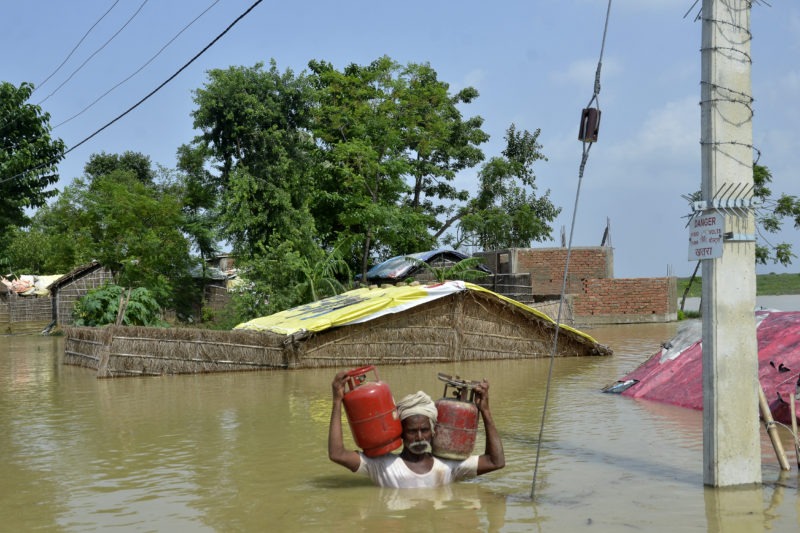‘Nobody cares about us’: Hunger and despair for India flood victims
A resident of Muzaffarpur carries gas canisters from his flooded home following heavy monsoon rains in the Indian state of Bihar (STR)
Muzaffarpur (India) (AFP) – Chest-deep in brown, flowing monsoon water and holding bags of clothes and utensils above their heads, residents in the Indian state of Bihar are hungry and despairing.
“When many of us poor people drown, then the politicians suddenly take notice… But otherwise, nobody cares about us,” shopkeeper Raj Majhi told AFP.
Majhi’s home — like many others — is submerged, with only rooftops remaining above floodwaters. His family have found their way to a small patch of land beside a highway, where they cook on a small stove.
Bihar is no stranger to floods, and is usually one of the worst-affected regions during the monsoons, but as one of the poorest regions in South Asia, residents feel helpless faced with the annual deluge.
This year’s floods — caused by torrential rains in Bihar and from across the border in Nepal — have been unrelenting.
Some 67 people have been killed in the state and 4.5 million residents affected by the floods so far, and water levels are still rising.
Thatched huts have been washed away and entire communities cut-off as roads and bridges are destroyed and crops devastated.
In Sitamarhi district, floodwaters cover roads and homes as far as the eye can see. Marooned villagers, tired from hours of wading through the churning waters, wait for help to arrive on small islands of higher ground.
Farmer Sonabati Devi managed to save some of her goats, but not much more.
“We left the house to save ourselves and left everything behind,” she said, sitting under a makeshift tent — one of many that have popped up around Sitamarhi using meagre household materials that villagers managed to salvage.
In areas where floodwaters have eased slightly, villagers cram into small, wooden boats or swim home to retrieve belongings.
Some have received khichdi — an Indian porridge made with rice and lentils — from the government.
“My children keep asking me for food and say they are hungry, but what can we do?,” said Nima Devi, who only eats once a day with her children when the khichdi is distributed.
But many others are going hungry, with next to no food supplies and only the clothes on their back.
In a rare spot of good news, no extreme warnings have been issued by national weather bureau for the days ahead, although rains could continue.
But even when the water retreats, villagers face the daunting task of cleaning up homes — now littered with rubbish accumulated by the flood — that weren’t swept away.
Disclaimer: Validity of the above story is for 7 Days from original date of publishing. Source: AFP.


